Notre-Dame Cathedral facts. Mass times
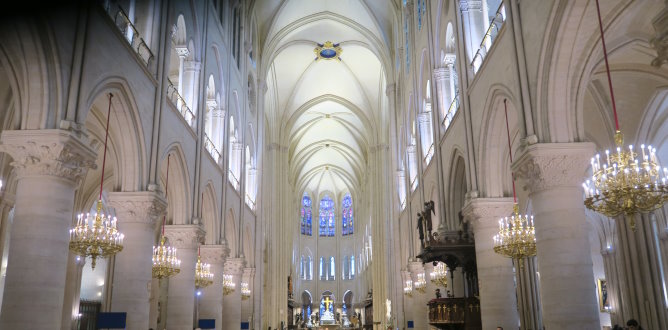
Notre-Dame Cathedral in Paris is a catholic church of stunning beauty and spirituality. In a year since its reopening in decembre 2024, 11 million Christians and visitors entered the cathedral to pray or discover an architectural jewel. 800 years old, Notre-Dame is 130 meters long, 48 meters wide and 35 meters high. Churches in Paris. Paris monuments.
Notre-Dame Cathedral facts
A testimony of eight centuries of Christian faith in the city, Notre-Dame Cathedral towers above the Seine river in Paris. Notre-Dame is the most visited monument in the city ahead of the Eiffel Tower and Sacré-Coeur.
Notre-Dame opening Hours: Monday to Friday: 7:50 AM – 7:00 PM. Closing on Thursday at 10:00 PM. Saturday and Sunday: 8:15 AM – 7:30 PM. Last entry 30 minutes before closing. Reservation for facilitated access to the cathedral is available on the web site. Access to the cathedral is free of charge every day of the year. Masses can be attended during opening hours.
Paris 75004 France
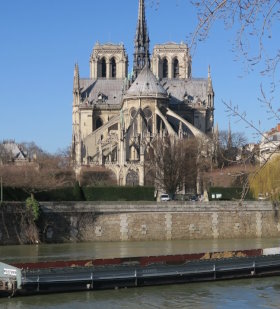
Notre-Dame Cathedral seen from Ile-Saint-Louis
Notre-Dame Cathedral mass
Unlike most famous monuments in the world, Notre-Dame is faithful to its original mission: glorify God and Jesus Christ. For the Christian and the non-Christian, attending a mass at Notre-Dame is a mystical experience of high intensity. The beauty of the cathedral, the catholic liturgy, the music of the organ and of the choir unite to elevate us above our daily lives. It is possible to attend the masses at 8 am, noon and 6 pm by a special queue, opened 20 to 30 minutes beforehand, in front of the central portal, the last judgement portal.
Notre-Dame Cathedral mass times
Monday to Friday:
8:00 AM – Angelus and Mass
12:00 PM – Angelus and Mass
3:00 PM – Rosary
5:30 PM – Vespers
6:00 PM – Mass and Angelus
Thursday, 6:45 PM – Eucharistic Adoration
Saturday:
8:30 AM – Angelus and Mass
12:00 PM – Angelus and Mass
3:00 PM – Rosary
5:15 PM – First Vespers
6:00 PM – Anticipated Mass and Angelus
Sunday:
8:30 AM – Mass
9:30 AM – Lauds
10:00 AM – Gregorian Mass
11:30 AM – Mass
5:15 PM – Vespers
6:00 PM – Diocesan Mass
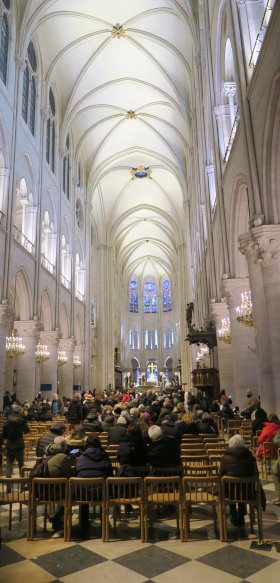
Masses are held daily in Notre-Dame
Crown of Thorns in Notre-Dame
The Crown of Thorn is guarded in the Cathedral's treasury by the Knights of the Order of the Holy Sepulcher of Jerusalem. Veneration of the Crown of Thorns takes place every Friday from 3:00 PM to 6:30 PM.
According to three of the canonical Gospels a woven crown of thorns was placed on the head of Jesus during the events leading up to his crucifixion. It was one of the instruments of the Passion, employed by Jesus' captors both to cause him pain and to mock his claim of authority. In 1238, the Emperor of Constantinople, anxious to obtain support for his empire, offered the Crown of Thorns to King Louis IX of France. It was then in the hands of the Venetians as security for a heavy loan, but it was redeemed and conveyed to Paris. Louis IX built the Sainte-Chapelle, completed in 1248, as the crown's shrine in his Palace, today the Conciergerie. The relic stayed there until the French Revolution. In 1801, it was deposited in Notre-Dame. Crown of Thorns.
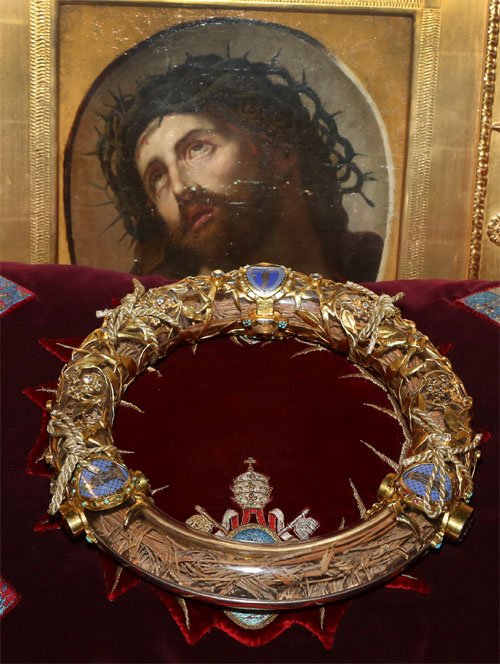
The Crown of Thorns is in Notre-Dame
Notre-Dame Cathedral architecture
Inspired by Saint Denis cathedral, Notre-Dame architecture is a marvel of Gothic art. In the 12th/13th centuries, the rib vault, flying buttress, and pointed arch were invented and allowed increasingly tall and light churches. Large stained-glass window panels beautifully lighted the interiors. Forming altogether a cross, the cathedral has a width of 48 meters, a length of 130 meters and a maximum height of 69 meters. It has a total of 113 windows.
The western facade has three portals. The central Portal of the last judgment displays sculptures showing the resurrection of the dead. An angel has a scale to weigh sins and virtues. Demons steal the souls of the sinful. These images had great weight on the faithful. The two beautiful side portals are dedicated to the Virgin Mary and Sint Anne, her mother. The large stained glass rose window of the western facade is nearly 10 meters in diameter. The north and south facades have windows of 13 meters in diameter.
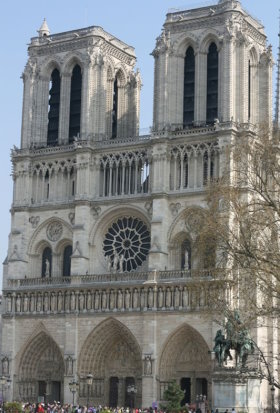
Notre-Dame Cathedral western facade
Notre-Dame towers
The two square towers are 69 metres tall. They sit on the western façade of Notre-Dame, flanking the main entrance. The west façade, including the towers, is Gothic, with a rhythm of vertical buttresses and horizontal lines (portals, galleries), typical of High/Classic Gothic style in France.
The South Tower was built between 1220 and 1240. The North Tower between 1235-1250. The towers house the bells, including the largest bell known as Emmanuel, which weighs about 13 tons. Visitors climb the 387 steps inside to reach the gallery of chimeras, gargoyles, and to get panoramic views over Paris.
The towers are open to visit since september 2025.
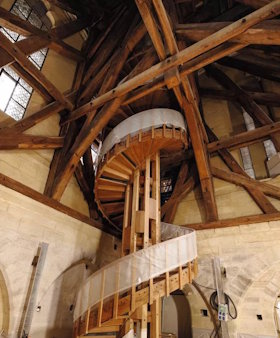
The Towers are open to the public
Stay in top Notre-Dame Cathedral hotel
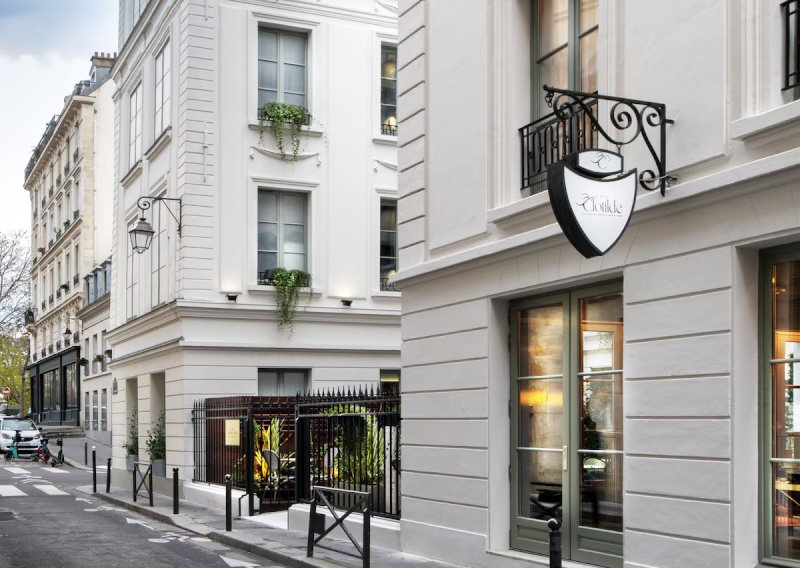
Notre-Dame Cathedral history
Paris, the former Lutetia, has been evangelized from the 3rd century. Notre-Dame is Paris Catholic Cathedral since the Middle Ages. Appointed bishop of Paris in 1160, Maurice de Sully decided to give the capital a cathedral worthy of France’s largest city. He wanted to build it in the style of the day, the Gothic style. King Louis VII encouraged the project.
The Church, notable residents of the city, and the entire population participated in the construction: some offered money, others offered their labor, while others offered their knowledge. Construction began in 1163. Notre-Dame was completed 109 years later, in 1272. During this time, many craftsman's guilds worked relentlessly under the supervision of seasoned architects. They all made an equal contribution to God and to Mary – Notre-Dame - to whom Maurice de Sully dedicated the cathedral.
Notre-Dame witnessed historic events, including the coronation of Napoléon (painting by David - December 2 1804) and the Magnificat for Paris liberation in the presence of Charles de Gaulle (picture - August 26th 1944).

Portal of the last judgment of Notre-Dame
Notre-Dame practical facts
Notre-Dame is located on Ile de la Cité, the Paris island that concentrated the power of France between the 4th and the 14th century. Notre-Dame is 130 meters long, 48 meters wide, 35 meters high. Its pillars have a diameter of 5 meters. The rose windows (picture) have a diameter of 10 meters.
Paris metro: Cité station on line 4. Saint Michel station on RER B and C lines. Locate Notre-Dame on Paris map.
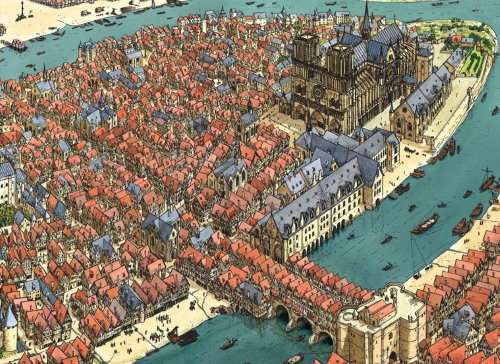
Notre-Dame dominated Paris in 15th century
Notre-Dame reopening
The reopening period extended from December 8 to June 8 2025, the feast of Pentecost. It included numerous celebrations and pilgrimages, while the entire Church experienced a jubilee year. A triduum and an octave were planned as well. A rocession, approximately two weeks before the reopening of the building, accompanied the return of the statue of Notre Dame de Paris. Having escaped the flames, this Virgin and Child, a 14th century masterpiece, which is 1.8 m high, has been preserved in Saint-Germain-L'auxerrois Church. The reopening began with a triduum including the official inauguration, on December 7: the handover of Notre-Dame by the state owner to the assignee, the Catholic Church; the awakening of the organ, a liturgical celebration with a blessing, the Magnificat or Te Deum, then vespers. The consecration of the altar took place during the first Mass in the restored cathedral on Sunday, December 8, the second Sunday of Advent this year. And the celebration of the feast of the Immaculate Conception, which was transferred to Monday, December 9.
Notre-Dame fire facts
A tragedy occured on Monday April 15 2019 greatly affecting people all over the world. Several hundred firefighters intervened to extinguish the fire that broke out and ravaged the cathedral. According to the Notre-Dame spokesperson, the fire broke out at 6:50 pm in the attic of the cathedral.
Around 7.50 pm, the 93m high spire of the cathedral, one of the symbols of Paris, collapsed. In a few hours, a good part of the roof of the building was reduced to ashes. "Two-thirds of the roof of Notre-Dame have been destroyed," said General Jean-Claude Gallet, commander of the heroic brigade of firefighters in Paris.
For several hours, Notre-Dame is watched over by the press, the curious, the Christians whose songs and prayers rise in unison, to ward off the tragedy. When the fire reaches the North Tower, despair is at its height; but the heroism of the firefighters saved the building from total destruction. That night, more than four hundred of them fought against the flames.

Notre-Dame Cathedral fire occured in 2019
Notre-Dame saved by a novel
At the end of the 1789 French revolution, Notre-Dame had suffered numberless injuries and mutilations. In early 19th century, the context is new: a new concordat was signed in 1801, and Notre-Dame went back to Roman Catholic worship in 1802. In 1831, French Novelist Victor Hugo published the now famous novel "The Hunchback of Notre-Dame". PDF text. The moving description of Notre-Dame in this beautiful and successful novel stirred considerable emotion. Intensive restoration work was started in 1845 by Architect Viollet Le Duc and completed in 1864.

The Hunchback of Notre-Dame is famous